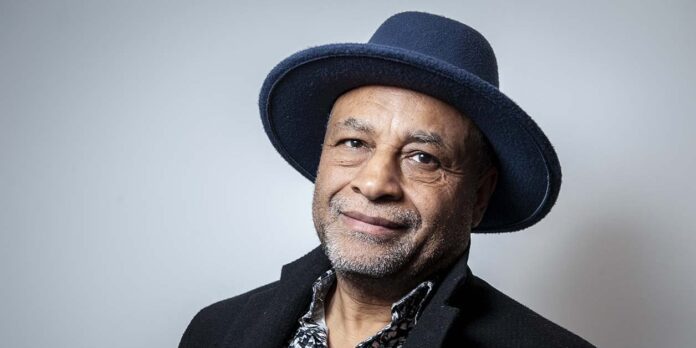We increased the number of interviews and publications between the months of June and August. On the phone, or face to face at a table in front of a beautiful dish of fish on the banks of the Ourcq canal, in Paris, Rodney Saint-Éloi is exactly as his friend, the French writer Catherine Blondeau, describes him: “Welcoming, serene, pleasant , generous with your time. He is overwhelmed with responsibilities, but never lets it show. »
We plan to talk about it, the 20th anniversary of Mémoire d'encrier, its Montreal publisher, and the first French-language publication of racial contract, the monument book by Charles W. Mills published in 1997, but the editor takes the time to talk about his European vacation. In Berlin, for the Bwa Kayiman event; then to Sierre, in the Swiss Valais, “admiring the curve of the mountains, like [s'il habitait] De novo [son] native Cavaillon”; on the island of Oléron, facing the sea; before Barcelona, “for the joy of living there and for Gaudí’s art”; all interspersed with some walks through the neighborhoods of Paris. “I went as far as I could, moving away from everything and closing my eyes, to see and understand. Being present in the world », he said. And also, without a doubt, measure the progress made in the rear view mirror.
Far and so close to Haiti
Twenty years ago, not long ago, Rodney Saint-Éloi settled in Montreal, escaping “the poverty and Haitian political stupidity that [le] was tired of.” For two years, the former journalist from News writer from Port-au-Prince “worked in cinema”, “did little things”, started teaching, but ran into an obstacle. Thus, “so as not to let exile [l]'Dano, [le] degrade,” he had returned to his first loves, writing and publishing.
In Haiti, in 1991, he co-founded the publishing house Mémoire with the poet Georges Castera. In the kitchen of his apartment in Montreal, Rodney Saint-Éloi analyzed the weaknesses of the Quebec publication: “Too white, it lacked diversity and otherness. » To remedy this situation, those who wanted to “observe the world without submitting to it” had the brilliant idea of creating a house to publish the works of Haitian authors. Inkwell Memory was born. “Memory” because what obsesses him and allows him to recover: a descendant of slaves, he always worries about what came before. “Inkwell”, because he learned to write with a pen.
The texts he chooses to publish are those that disturb him and prevent him from sleeping, but that will probably be good for the reader.
At the beginning of the adventure, Rodney Saint-Éloi published the works of Haitians in the diaspora. Then, those of all Haitians, Africans and First Nations peoples. “My imagination as an author and editor was marked by a verse by Joséphine Bacon in which she presents herself as the “survivor of a story that cannot be told””, he explains. So he found other “survivors” to tell these untold stories.
“Home of racialized people”
Twenty years later, the little house published more than 400 titles and established itself on the French-speaking literary scene. Mémoire d'encrier now receives more than 1,000 manuscripts a year. “We publish a book by Alain Mabanckou or Blaise Ndala and, the next day, all the Congolese come running! In their eyes, we are a “house of racialized people” that could be sensitive to the writing dreams of young people from Douala, Kinshasa or Port-au-Prince. » Rejecting a manuscript is therefore sometimes painful. But when necessary, Rodney Saint-Éloi always aims to add “a touch of fashion”. In its 2023 catalogue, two new features for the French literary season: Above the ground, by Philippe Yong and Adriano's violin, by Gary Victor.
From academic Dany Laferrière, Médicis Prize 2009, Makenzy Orcel, finalist for the Goncourt Prize 2022, viaYanick Lahens, Femina Prize 2014, most Haitian authors, including the greatest, had Rodney Saint-Éloi as editor. Africans of great notoriety too, such as the Senegalese Felwine Sarr, the French-Djiboutian Abdourahman Waberi, who compare Mémoire d'encrier to a Creole garden where several nationalities and around thirty languages intersect.
Saint-Éloi says he is not very attached to the authors' notoriety. What matters is making unique voices heard, “that bring something to the great human voice”. Mémoire d'encrier aims to be a platform where different variations of a world come together that, far from being Manichaean, is a conjunction of imaginations, histories and cultures.
Real exercise
Rodney Saint-Eloi he also wants to “rethink literary geography”. “We have long thought that we can only observe the world from big cities like Paris, London, New York. We can also do it from a village in Chad or a village in Haiti. I want to create a linguistic community in which the notions of center and periphery disappear. The future of the world depends on active otherness. »
Rodney wants to remind everyone that the meeting between continents has already happened, that it produced fraternal cultures and imaginations and that we have forgotten it. But not him
Thus, the texts you choose are “those that [le] push and [l'] prevent sleep, but that will probably be good for the reader. He publishes The Racial Contract because “it is a fundamental book that every black person should read”. It explains how our modernity was built on the racialization of the world and the fact that the deconstruction of white supremacy is not carried out against white people, but aims at transforming and reimagining the world.” Pomegranateby Tunisian Elkahna Talbi, encourages reflection on the second generation of Arabs living in Canada. WithFrom mother to mother,Sindiwe Magona offers the world a black South African perspective on apartheid. InWhite, Just as Frantz Fanon becomes aware of the color of his skin through the eyes of others, Catherine Blondeau becomes aware of her whiteness and her privileges in South Africa, where she directs the French Institute. While Naomi Fontaine, in Kuessipanthe company's best-selling book, chronicles everyday life on the Uashat Innu reservation.
Activist ofIn contrast, Saint-Éloi brings together humans who create counter-discourses. He defines himself as an independent editor, refusing to respond to the dictates of dominant ideas – and even to the tyranny of the black issue which, for him, must also echo other conditions. Resolutely decolonial, he wants to offer an unexpected library. “I turn to stories that have never been told, because I deeply believe that there is an injustice that needs to be corrected. It is a truly necessary exercise for coexistence. »
“Rodney is a poet, in the existential and not simply literary sense of the term”, emphasizes Mohamed Mbougar Sarr. He has absolute confidence in the word, to touch, to tell the truth, to seek meaning, to question. That would approach almost like a child – he laughs – but a combative child. More than trying to unite the continents, it wants to remind everyone that this meeting has already happened, that it produced fraternal cultures and imaginations, and that we have forgotten it. But not him. »
Listen to others
This struggle for otherness is linked to the personal story of this divorced father of two children, who sees himself as a tormented soul, calmed by history. As he himself admits, his need for the Other increased with the death of his mother, to whom he paid a vibrant tribute in When Bertha is sad, she sings. Written to heal the missed meetings, the non-existent conversations – both in exile, they were separated, he in Montreal, she in Connecticut, in the United States, the book allowed him to reestablish dialogue and be more attentive to others.
As descendants of slaves, we are the result of the most absolute violence against black people. We need to find all our stories
We do not enter Rodney Saint-Éloi's private life through an invasion, but rather through this mirror book in which he strips naked, talking to his mother. The eldest of four children, from different fathers, the result of fleeting love affairs between a modest black woman and her mulatto son from a wealthy family, “decorated” with his mother's name, proof of his father's absence, is “an unworthy son, an bastard” for the institutions he attended as a child. He, therefore, needs to “[himself] fight to build [his] legitimacy: to make it known that he is simply a human being”.
He succeeded, helped by a trio of protagonists, his “grandmother”, his grandmother and his mother, who helped him “get through existence”. “My grandmother told me I was a prince. I believe in her,” he explains. In his mother's family, he receives the title of “doctor” or “engineer”, proving that he has a bright future and that he will lift his community out of poverty.
“Women like Bertha are not found in museums, but in backyards. Placing his figure in the foreground is saying: “Here is a human being, here is beauty, dignity, revolt, passion, life”. Only through a book can my editor, Héloïse d'Ormesson, daughter of the academic Jean d'Ormesson, be able to sit in a living room in the company of Bertha. So many things separate them and only literature can unite them. »
Learning lessons from the past
Giving voice and space to Haiti, “which left but never left”, is also part of this fight. “Remaining in this impossible country, where hope is exhausted, where we must build from chaos, is a form of subversion. » He must therefore help the heroes who do this. When you think about your island, Saint-Éloi go back to your childhood and see images of a country that exudes a beautiful energy: the child on the way to school, the smell of lemongrass, the Creole music. On another island, this one deserted, the poet-editor would take the musicians Coupé Cloué, Tabou Combo, Système Ben, Manno Charlemagne (Chalmay, in Creole), Beethova Obas...
For Pepi (a nickname given to him by his grandmother Contita), whom Felwine Sarr baptized Wagane (“the undefeated”, in the Serer language) Ndiaye after a visit to Saint-Louis in Senegal, Africa is essential in this search for otherness. He is sensitive to everything that happens there, is said there, is written there. “As descendants of slaves, we are the result of the most absolute violence against black people. And, as Fabienne Kanor explains in The Poetics of the Basement, we must return to the slave ship erased from memories to find coherence and totality in our stories. Understand how the first displacement occurred, how slavery occurred and how white supremacy was consolidated, what our share of responsibility is and what lessons we can learn from it to overcome trauma and move forward. »
At the same time, Rodney Saint-Éloi attempted to “create [his] own geography.” He just visited the West Bank “to address the occupation.” “The West is part of a logic of conquest and management of abundance. Now, the other counterpart to conquest is expropriation; You are an area where people are fighting to preserve their little piece of land. »
At the end of the trip, there is no triumphalism on the part of this sexagenarian who would have reason to demonstrate it. For the poet, the greatest reward is the ten hours of driving and queuing up by readers for a dedication. Or the words of gratitude from an Inuit anthropologist, who told him: “I did not expect to see Inuit authors published in My alive… "

